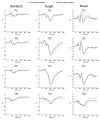Cognitive decline and aging: the role of concussive and subconcussive impacts
- PMID: 22728452
- PMCID: PMC3685434
- DOI: 10.1097/JES.0b013e3182524273
Cognitive decline and aging: the role of concussive and subconcussive impacts
Abstract
Concussion has been viewed historically as a transient injury with no evidence supporting the existence of persistent effects. However, our recent work demonstrates electroencephalographic and motor control changes in otherwise healthy individuals with a history of concussion. We therefore hypothesize that concussive and subconcussive head impacts set about a cascade of pathological events that accelerates declines in cognitive function typically associated with the aging process.
Figures



References
-
- Broglio SP, Pontifex MB, O’Connor P, Hillman CH. The persistent effects of concussion on neuroelectic indices of attention. J Neurotrauma. 2009;26:1463–70. - PubMed
-
- Burke SN, Barnes CA. Neural plasticity in the ageing brain. Nat Rev Neurosci. 2006;7:30–40. - PubMed
-
- Collins MW, Grindel SH, Lovell MR, et al. Relationship between concussion and neuropsychological performance in college football players. JAM A. 1999;282:964–70. - PubMed
-
- De Beaumont L, Theoret H, Mongeon D, et al. Brain function decline in healthy retired athletes who sustained their last sports concussion in early adulthood. Brain. 2009;132:695–708. - PubMed
Publication types
MeSH terms
Grants and funding
LinkOut - more resources
Full Text Sources
Medical

